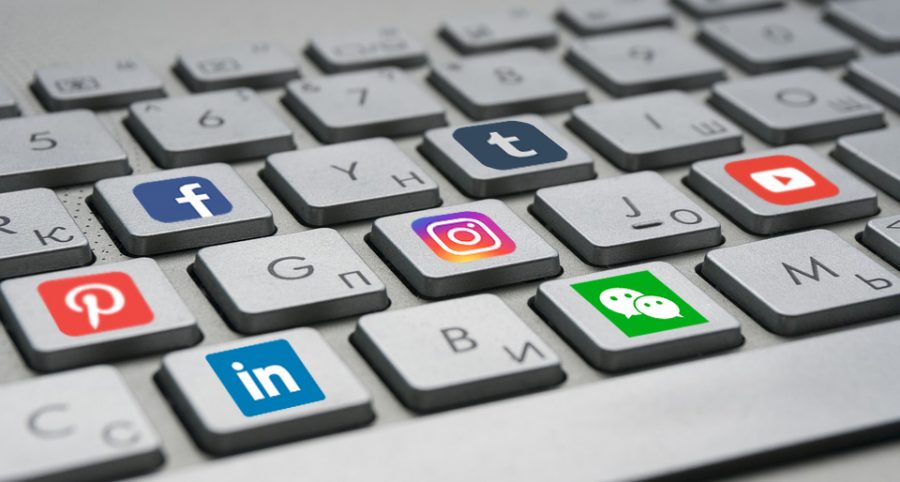How access to information doesn’t mean you are informed
Today Testing (For derivative), CC BY-SA 4.0, via Wikimedia Commons
Social media is one way accurate and inaccurate information can spread to the general public, especially with the COVID-19 pandemic and upcoming election .
October 28, 2020
As we near the end of 2020 (yes, you read that right, “the end”) and approach the upcoming election, it’s a good time to familiarize yourself with the media you come face to face with every day. It’s easy to assume that by living in the age of information you are better informed than you would have been 50 years ago, but that is simply not true.
The capacity to be more informed does not mean that you are.
With social media being such an integral part of our day to day lives, it’s easy to hear a story told a million different times in a million different ways and still not know what’s true and what’s not.
On the surface level, this is not the worst thing that could happen: it essentially brings attention to an issue, topic or concern. The problem lies in the fact that many people end their research there. They see one Instagram post, watch one TikTok video and read one tweet, and suddenly they are making their own post, their own video and their own tweet as if they have thoroughly researched the topic.
Suddenly, we have a cycle of people sharing information without even knowing where it came from.
This isn’t to say that these people have malevolent intentions; rather, by not putting in extra work and critical thought they have given fuel to the flames.
2020 is the perfect year to observe the negative impacts of spreading false information especially in regards to COVID-19 and details concerning the upcoming election.
Early last summer, I learned that a woman I know personally had read about a study suggesting that giving CBD gummies to children would help them “get over” having COVID-19 faster. Lo and behold, she gave her two children CBD gummies regularly until someone told her that there wasn’t much evidence behind it. So much so that in doing a quick fact check, I could only find one reputable article that was even slightly similar to what she was claiming was a fact.
The article itself doesn’t mention children at all, only the use of CBD oil as a treatment for acute respiratory distress syndrome (a symptom of COVID-19).
Since then, I have found that she came to this conclusion by reading blog posts that misinterpreted the use of CBD oil as a treatment for specific types of epilepsy as a reason to give it to children to boost their immune system.
This is just one example of the misinformation that has been shared throughout the pandemic. According to CNN, doctors say “coronavirus myths are ‘spreading faster than the virus itself.’” Rumors and conspiracy theories circulate the internet that go as far as to claim that the virus is a bio-weapon funded by Bill Gates to “further vaccine sales.”
This information can be harmful for many reasons, but the biggest concern is that it delegitimizes COVID-19 and the professionals who are risking their health for others. CNN reports that these falsehoods are encouraging patients to argue with their doctors about treatment plans and what they should do–as if they have any qualifications to do so.
Misinformation is heavily influencing the election and voters’ perception of what it will be like. Rumors have circulated about a “Democrat-led coup,” COVID-19 being a scam to encourage voting by mail and an election day civil war.
And, though it may be funny to laugh at these asinine and unfounded theories, they reach a lot of people and cause a lot of fear. In the case of the coup, a New York Times analysis found that “at least 938 Facebook groups, 279 Facebook pages, 33 YouTube videos and hundreds of tweets” were spreading that rumor.
How hard is it to believe that people would be scared to vote for a certain party if they were told there would be a civil war? A hostile takeover? It’s voter suppression on the psychological level, and it comes from everyday citizens spreading information with no facts behind it.
According to a study done at MIT Sloan, “people who share false information are more likely distracted or lazy, rather than biased” and “Falsehoods are 70% more likely to be retweeted on Twitter than the truth, and reach their first 1,500 people six times faster.” Pair this with the fact that many people exist in vacuums due to social media and it creates distinct groups of people who will disagree with each other despite lacking any real evidence in support of their claims.
This doesn’t mean that we can’t be better. Another MIT study found that “when people had a chance to deliberate about the accuracy of news headlines, they were more likely to identify false headlines than they were when they made a snap judgement.”
All it takes is a little critical thought to see through most misinformation. If we fact check ourselves and apply prior knowledge, it would make a world of difference.
Editor’s note: The author of this piece asked for their name to be removed due to safety issues following their graduation.








